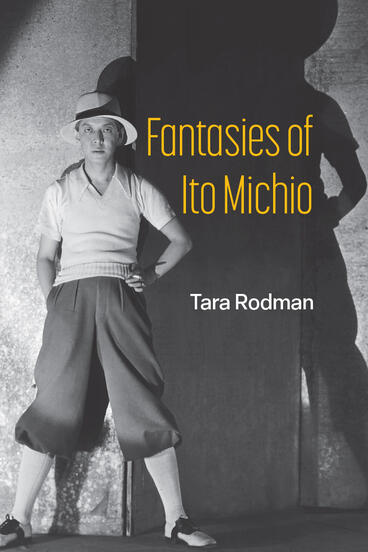Fantasies of Ito Michio
Chronicles Ito Michio’s career and explores how fantasy sustains a life disrupted by war, racialization, and imperialism
Description
Born in Japan and trained in Germany, dancer and choreographer Ito Michio (1893–1961) achieved prominence in London before moving to the U.S. in 1916 and building a career as an internationally acclaimed artist. During World War II, Ito was interned for two years, and then repatriated to Japan, where he contributed to imperial war efforts by creating propaganda performances and performing revues for the occupying Allied Forces in Tokyo. Throughout, Ito continually invented stories of voyages made, artists befriended, performances seen, and political activities carried out—stories later dismissed as false.
Fantasies of Ito Michio argues that these invented stories, unrealized projects, and questionable political affiliations are as fundamental to Ito’s career as his ‘real’ activities, helping us understand how he sustained himself across experiences of racialization, imperialism, war, and internment. Tara Rodman reveals a narrative of Ito’s life that foregrounds the fabricated and overlooked to highlight his involvement with Japanese artists, such as Yamada Kosaku and Ishii Baku, and global modernist movements. Rodman offers “fantasy” as a rubric for understanding how individuals such as Ito sustain themselves in periods of violent disruption and as a scholarly methodology for engaging the past.
Tara Rodman is Assistant Professor of Drama at the University of California, Irvine.
Reviews
“By insisting on staying with the contradictory and fantasy aspects of Ito, Rodman helps us see precisely why he has presented such a problem for the canon, and at the same time, why he is such a crucial figure to attend to. Her consideration of fantasy as a structuring logic for Ito’s life, and therefore as an important methodology for grappling with it, is a promising model for future scholars.”
- Rosemary Candelario, University of Texas at Austin
“Asks critical questions about nation, imperialism, and identity as they relate to the body. By following Itō’s movements across the world, Rodman explores conceptions of Japaneseness in the first half of the 20th century, a time when anti-Asian hostility was increasing in the US and, in parallel, when Japan was expanding its empire throughout Asia.”
- Jessica Nakamura, University of California, Santa Barbara
“Finally! A rich, book-length portrait of Ito Michio, a critical but elusive figure in the history of modern dance. Tara Rodman offers both an abundant narrative of his life and work and, in a satisfyingly paradoxical way, a theorization of fantasy as the most appropriate method for approaching this fantastical artist. Instead of working in vain to get at the ‘real’ Ito, Rodman keenly embraces the dancer’s penchant for fabrication. Writing with evocative detail and deft analysis, she demonstrates how his fantasies are revelatory both of Ito’s own desires and of the investments (particularly in Orientalism) that the world projected onto him. Fantasies of Ito Michio is an impactful contribution to dance history, transnational Asian American studies, and studies of imperialism and modernity. An engrossing and important read!”
- SanSan Kwan, University of California, Berkeley
“Michio Ito has long been a phantasm in histories of modern performance: a fleeting figure who appears as a shadowy, uninterrogated footnote. Rodman’s meticulously researched account of the dynamics of fantasy in Ito’s practice returns him to center stage, brilliantly contextualizing his work within the histories of race and empire in which it is implicated.”
- Joshua Takano Chambers-Letson, Northwestern University

